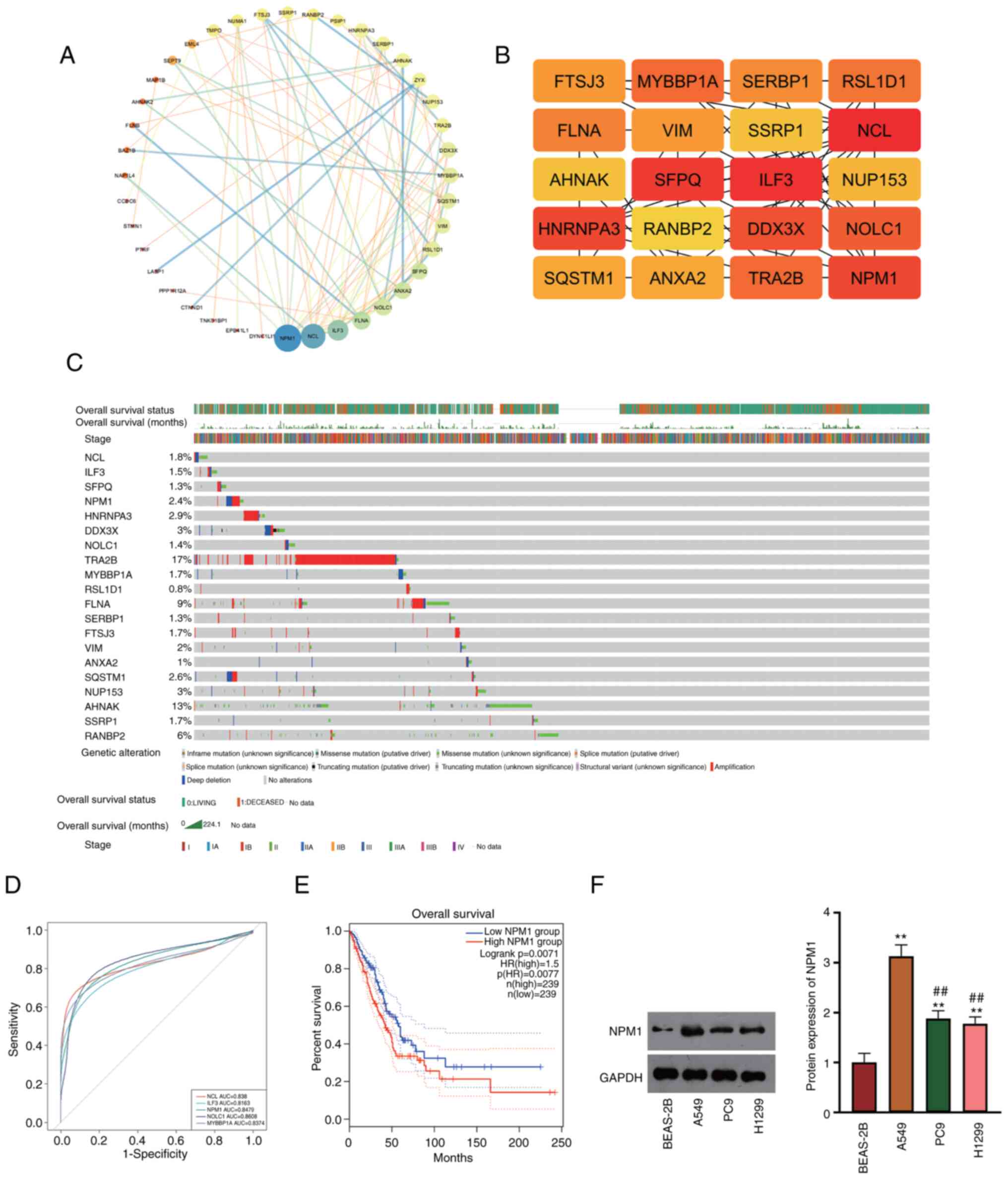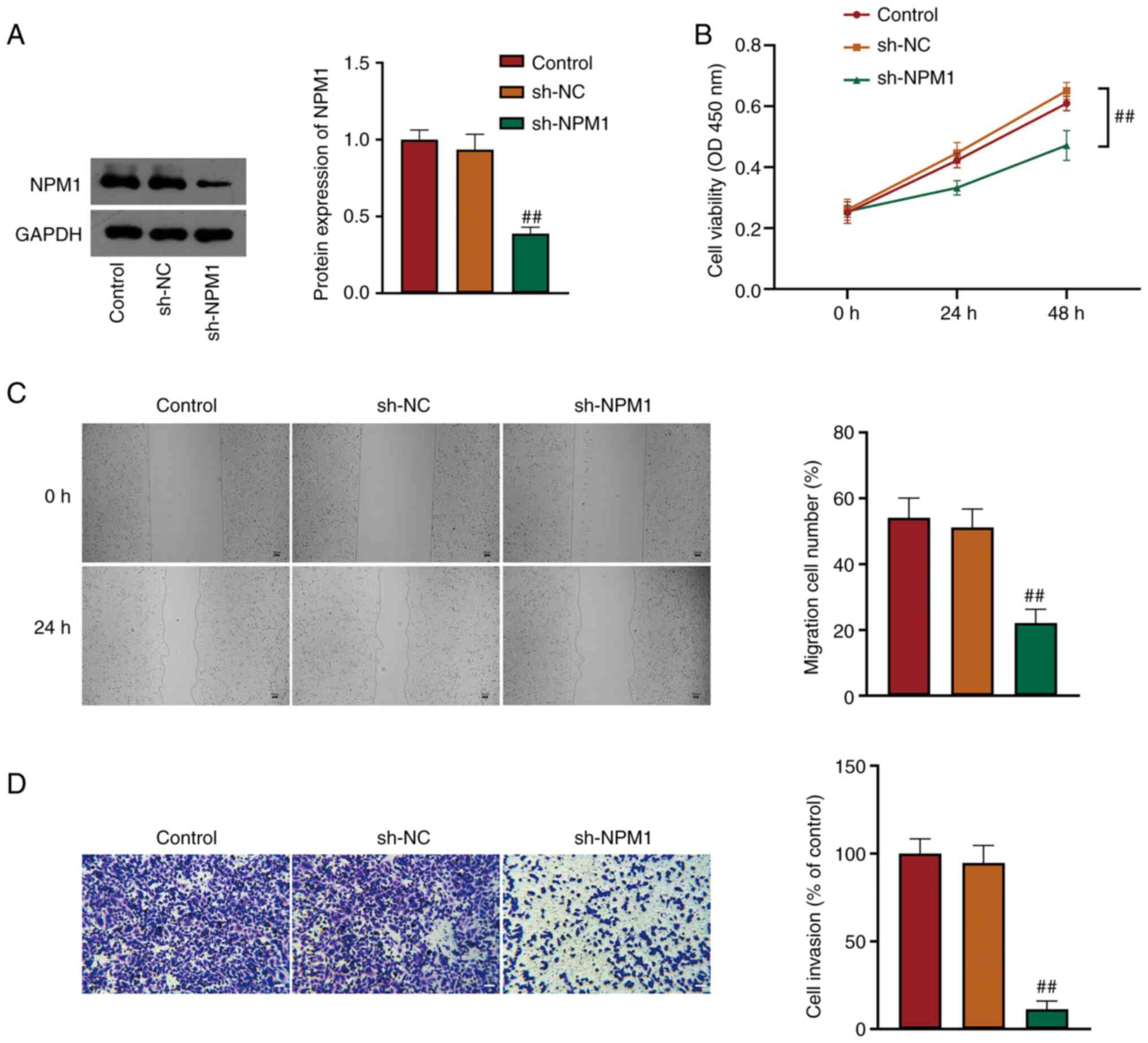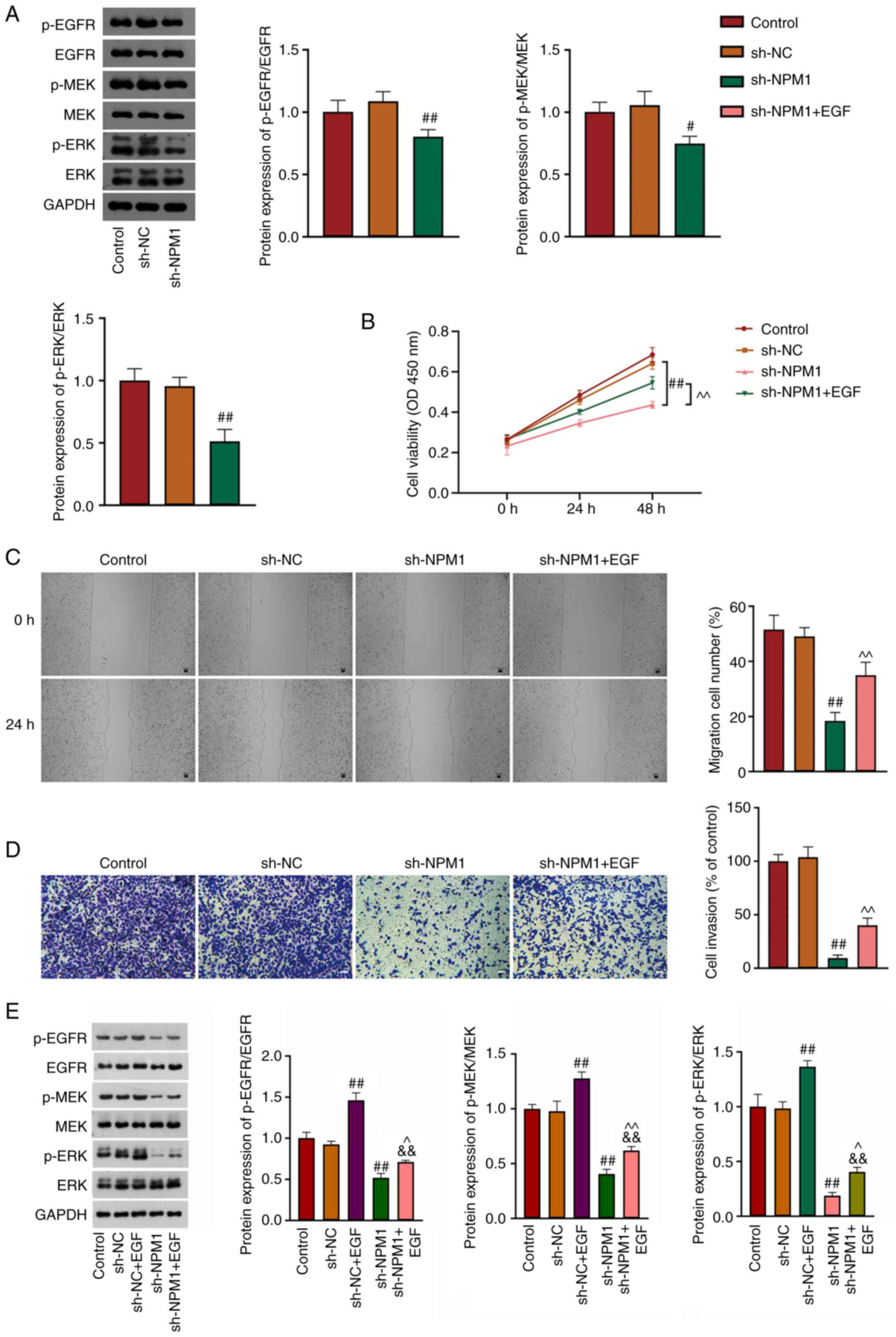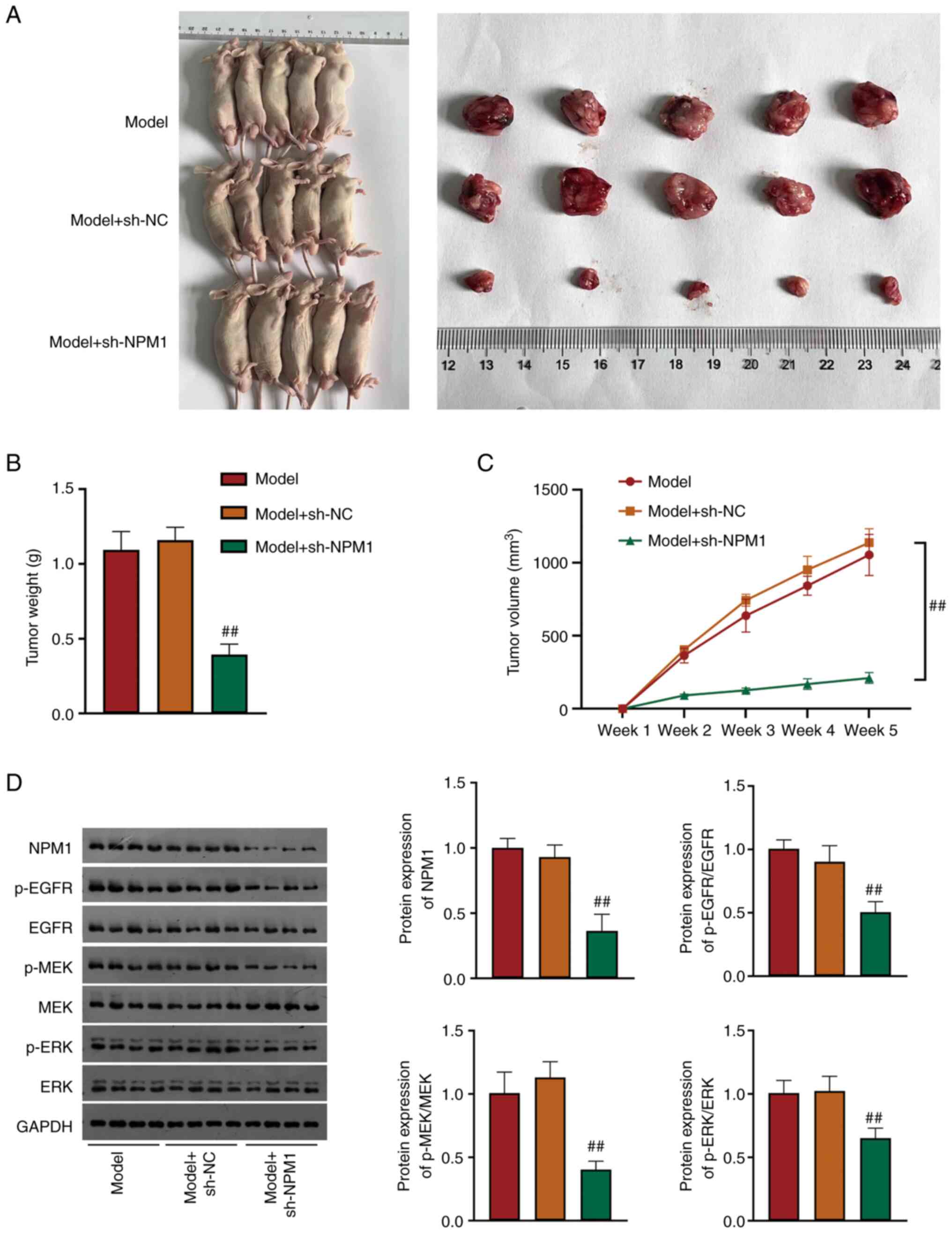|
1
|
Wu Z, Bai X, Lu Z, Liu S and Jiang H:
LINC01094/SPI1/CCL7 axis promotes macrophage accumulation in lung
adenocarcinoma and tumor cell dissemination. J Immunol Res.
2022:64507212022. View Article : Google Scholar : PubMed/NCBI
|
|
2
|
Zhao X, Chen Y, Sun X, He Z, Wu T, Wu C,
Chen J, Wang J, Diao K and Liu XS: Oncogenic EFNA4 amplification
promotes lung adenocarcinoma lymph node metastasis. Cancers
(Basel). 14:42262022. View Article : Google Scholar : PubMed/NCBI
|
|
3
|
Bai J, Li H, Chen X, Chen L, Hu Y, Liu L,
Zhao Y, Zuo W, Zhang B and Yin C: LncRNA-AC009948.5 promotes
invasion and metastasis of lung adenocarcinoma by binding to
miR-186-5p. Front Oncol. 12:9499512022. View Article : Google Scholar : PubMed/NCBI
|
|
4
|
Li R, Mu C, Cao Y and Fan Y: METTL7B
serves as a prognostic biomarker and promotes metastasis of lung
adenocarcinoma cells. Ann Transl Med. 10:8952022. View Article : Google Scholar : PubMed/NCBI
|
|
5
|
Ma K, Jin Q, Wang M, Li X and Zhang Y:
Research progress and clinical application of predictive biomarker
for immune checkpoint inhibitors. Expert Rev Mol Diagn. 19:517–529.
2019. View Article : Google Scholar : PubMed/NCBI
|
|
6
|
Miller KD, Siegel RL, Lin CC, Mariotto AB,
Kramer JL, Rowland JH, Stein KD, Alteri R and Jemal A: Cancer
treatment and survivorship statistics, 2016. CA Cancer J Clin.
66:271–289. 2016. View Article : Google Scholar : PubMed/NCBI
|
|
7
|
Guo J, Li A, Guo R, He Q, Wu Y, Gou Y, Jin
J and Huang G: C1orf74 positively regulates the EGFR/AKT/mTORC1
signaling in lung adenocarcinoma cells. PeerJ. 10:e139082022.
View Article : Google Scholar : PubMed/NCBI
|
|
8
|
Liu J, Yang H, Yin D, Jia Y, Li S and Liu
Y: Expression and prognostic analysis of CLDN18 and Claudin18.2 in
lung adenocarcinoma. Pathol Res Pract. 238:Aug 10–2022.(Epub ahead
of print). View Article : Google Scholar
|
|
9
|
Qiu X, Liu W, Zheng Y, Zeng K, Wang H, Sun
H and Dai J: Identification of HMGB2 associated with proliferation,
invasion and prognosis in lung adenocarcinoma via weighted gene
co-expression network analysis. BMC Pulm Med. 22:3102022.
View Article : Google Scholar : PubMed/NCBI
|
|
10
|
La Manna S, Florio D, Di Natale C, Lagreca
E, Sibillano T, Giannini C and Marasco D: Type C mutation of
nucleophosmin 1 acute myeloid leukemia: Consequences of intrinsic
disorder. Biochim Biophys Acta Gen Subj. 1866:1301732022.
View Article : Google Scholar : PubMed/NCBI
|
|
11
|
Venanzi A, Rossi R, Martino G, Annibali O,
Avvisati G, Mameli MG, Sportoletti P, Tiacci E, Falini B and
Martelli MP: A curious novel combination of nucleophosmin (NPM1)
gene mutations leading to aberrant cytoplasmic dislocation of NPM1
in acute myeloid leukemia (AML). Genes (Basel). 12:14262021.
View Article : Google Scholar : PubMed/NCBI
|
|
12
|
Nemeckova S, Alexova-Zurkova K, Hainz P,
Krystofova J, Mackova J, Roubalova K, Stastna-Markova M, Vrana M
and Vydra J: Non-mutated nucleophosmin 1 is recognized by the CD8+
T lymphocytes of an AML patient after the transplantation of
hematopoietic stem cells from an HLA-haploidentical donor. Curr
Oncol. 29:2928–2934. 2022. View Article : Google Scholar : PubMed/NCBI
|
|
13
|
Zhou Y, Fang Y, Zhou J, Liu Y, Wu S and Xu
B: NPM1 is a novel therapeutic target and prognostic biomarker for
ewing sarcoma. Front Genet. 12:7712532021. View Article : Google Scholar : PubMed/NCBI
|
|
14
|
Zeng D, Xiao Y, Zhu J, Peng C, Liang W and
Lin H: Knockdown of nucleophosmin 1 suppresses proliferation of
triple-negative breast cancer cells through activating
CDH1/Skp2/p27kip1 pathway. Cancer Manag Res. 11:143–156. 2018.
View Article : Google Scholar : PubMed/NCBI
|
|
15
|
Peng HH, Ko HH, Chi NC, Wang YP, Lee HC,
Pan PY, Kuo MY and Cheng SJ: Upregulated NPM1 is an independent
biomarker to predict progression and prognosis of oral squamous
cell carcinomas in Taiwan. Head Neck. 42:5–13. 2020. View Article : Google Scholar : PubMed/NCBI
|
|
16
|
Liu XS, Zhou LM, Yuan LL, Gao Y, Kui XY,
Liu XY and Pei ZJ: NPM1 is a prognostic biomarker involved in
immune infiltration of lung adenocarcinoma and associated with m6A
modification and glycolysis. Front Immunol. 12:7247412021.
View Article : Google Scholar : PubMed/NCBI
|
|
17
|
Greenspan LJ, de Cuevas M, Le KH, Viveiros
JM and Matunis EL: Activation of the EGFR/MAPK pathway drives
transdifferentiation of quiescent niche cells to stem cells in the
Drosophila testis niche. Elife. 11:e708102022. View Article : Google Scholar : PubMed/NCBI
|
|
18
|
Lim WC, Choi HK, Kim KT and Lim TG: Rose
(Rosa gallica) petal extract suppress proliferation, migration, and
invasion of human lung adenocarcinoma A549 cells through via the
EGFR signaling pathway. Molecules. 25:51192020. View Article : Google Scholar : PubMed/NCBI
|
|
19
|
Xu H, Yang X, Xuan X, Wu D, Zhang J, Xu X,
Zhao Y, Ma C and Li D: STAMBP promotes lung adenocarcinoma
metastasis by regulating the EGFR/MAPK signaling pathway.
Neoplasia. 23:607–623. 2021. View Article : Google Scholar : PubMed/NCBI
|
|
20
|
Zhou Z, Wang W, Xie X, Song Y, Dang C and
Zhang H: Methylation-induced silencing of SPG20 facilitates gastric
cancer cell proliferation by activating the EGFR/MAPK pathway.
Biochem Biophys Res Commun. 500:411–417. 2018. View Article : Google Scholar : PubMed/NCBI
|
|
21
|
Ji J, Li C, Wang J, Wang L, Huang H, Li Y
and Fang J: Hsa_circ_0001756 promotes ovarian cancer progression
through regulating IGF2BP2-mediated RAB5A expression and the
EGFR/MAPK signaling pathway. Cell Cycle. 21:685–696. 2022.
View Article : Google Scholar : PubMed/NCBI
|
|
22
|
Huang J, Liu J and Qiu L: Transient
receptor potential vanilloid 1 promotes EGFR ubiquitination and
modulates EGFR/MAPK signalling in pancreatic cancer cells. Cell
Biochem Funct. 38:401–408. 2020. View
Article : Google Scholar : PubMed/NCBI
|
|
23
|
Loubeau G, Boudra R, Maquaire S,
Lours-Calet C, Beaudoin C, Verrelle P and Morel L: NPM1 silencing
reduces tumour growth and MAPK signalling in prostate cancer cells.
PLoS One. 9:e962932014. View Article : Google Scholar : PubMed/NCBI
|
|
24
|
Gray KA, Seal RL, Tweedie S, Wright MW and
Bruford EA: A review of the new HGNC gene family resource. Hum
Genomics. 10:62016. View Article : Google Scholar : PubMed/NCBI
|
|
25
|
von Mering C, Huynen M, Jaeggi D, Schmidt
S, Bork P and Snel B: STRING: A database of predicted functional
associations between proteins. Nucleic Acids Res. 31:258–261. 2003.
View Article : Google Scholar : PubMed/NCBI
|
|
26
|
Shannon P, Markiel A, Ozier O, Baliga NS,
Wang JT, Ramage D, Amin N, Schwikowski B and Ideker T: Cytoscape: A
software environment for integrated models of biomolecular
interaction networks. Genome Res. 13:2498–2504. 2003. View Article : Google Scholar : PubMed/NCBI
|
|
27
|
Gao J, Aksoy BA, Dogrusoz U, Dresdner G,
Gross B, Sumer SO, Sun Y, Jacobsen A, Sinha R, Larsson E, et al:
Integrative analysis of complex cancer genomics and clinical
profiles using the cBioPortal. Sci Signal. 6:pl12013. View Article : Google Scholar : PubMed/NCBI
|
|
28
|
Tang Z, Kang B, Li C, Chen T and Zhang Z:
GEPIA2: An enhanced web server for large-scale expression profiling
and interactive analysis. Nucleic Acids Res. 47((W1)): W556–W560.
2019. View Article : Google Scholar : PubMed/NCBI
|
|
29
|
Zhou F, Yu T, Xiao F, Wang B, Tian W, Xu
R, Zhao X, Zeng A, Liu N, Wang Y, et al: Periostin promotes EMT via
inhibition of RIN1-mediated endocytosis of EGFR in gliomas. Holist
Integr Oncol. 1:192022. View Article : Google Scholar
|
|
30
|
Luo J and Du X: A promising prognostic
signature for lung adenocarcinoma (LUAD) patients basing on 6
hypoxia-related genes. Medicine (Baltimore). 100:e282372021.
View Article : Google Scholar : PubMed/NCBI
|
|
31
|
Yu Y, Wang Z, Zheng Q and Li J: GREB1L
overexpression correlates with prognosis and immune cell
infiltration in lung adenocarcinoma. Sci Rep. 11:132812021.
View Article : Google Scholar : PubMed/NCBI
|
|
32
|
Box JK, Paquet N, Adams MN, Boucher D,
Bolderson E, O'Byrne KJ and Richard DJ: Nucleophosmin: From
structure and function to disease development. BMC Mol Biol.
17:192016. View Article : Google Scholar : PubMed/NCBI
|
|
33
|
Karimi Dermani F, Gholamzadeh Khoei S,
Afshar S and Amini R: The potential role of nucleophosmin (NPM1) in
the development of cancer. J Cell Physiol. 236:7832–7852. 2021.
View Article : Google Scholar : PubMed/NCBI
|
|
34
|
Ruan Y, Xu H and Ji X: High expression of
NPM1 via the Wnt/β-catenin signalling pathway might predict poor
prognosis for patients with prostate adenocarcinoma. Clin Exp
Pharmacol Physiol. 49:525–535. 2022. View Article : Google Scholar : PubMed/NCBI
|
|
35
|
Zhu Y, Shi M, Chen H, Gu J, Zhang J, Shen
B, Deng X, Xie J, Zhan X and Peng C: NPM1 activates metabolic
changes by inhibiting FBP1 while promoting the tumorigenicity of
pancreatic cancer cells. Oncotarget. 6:21443–21451. 2015.
View Article : Google Scholar : PubMed/NCBI
|
|
36
|
Wang D, Li Y, Liu Y, Cheng S, Liu F, Zuo
R, Ding C, Shi S and Liu G: NPM1 promotes cell proliferation by
targeting PRDX6 in colorectal cancer. Int J Biochem Cell Biol.
147:1062332022. View Article : Google Scholar : PubMed/NCBI
|
|
37
|
Dai L, Li J, Xing M, Sanchez TW, Casiano
CA and Zhang JY: Using serological proteome analysis to identify
serum anti-nucleophosmin 1 autoantibody as a potential biomarker in
European-American and African-American patients with prostate
cancer. Prostate. 76:1375–1386. 2016. View Article : Google Scholar : PubMed/NCBI
|
|
38
|
Guo CA, Su XL, Wang WJ, Xia TH, Cao XM,
Yuan SB, Wang WA, Zhang A and Liu HB: NPM1 is a diagnostic and
prognostic biomarker associated with the clinicopathological
characteristics of gastric cancer. Neoplasma. 69:965–975. 2022.
View Article : Google Scholar : PubMed/NCBI
|
|
39
|
Jing Y, Jiang X, Lei L, Peng M, Ren J,
Xiao Q, Tao Y, Tao Y, Huang J, Wang L, et al: Mutant NPM1-regulated
lncRNA HOTAIRM1 promotes leukemia cell autophagy and proliferation
by targeting EGR1 and ULK3. J Exp Clin Cancer Res. 40:3122021.
View Article : Google Scholar : PubMed/NCBI
|
|
40
|
Liu Q, Liu N, Shangguan Q, Zhang F, Chai
W, Tong X, Zhao X, Li Z, Qi D and Ye X: LncRNA SAMD12-AS1 promotes
cell proliferation and inhibits apoptosis by interacting with NPM1.
Sci Rep. 9:115932019. View Article : Google Scholar : PubMed/NCBI
|
|
41
|
Ishola AA, Chien CS, Yang YP, Chien Y,
Yarmishyn AA, Tsai PH, Chen JC, Hsu PK, Luo YH, Chen YM, et al:
Oncogenic circRNA C190 promotes non-small cell lung cancer via
modulation of the EGFR/ERK pathway. Cancer Res. 82:75–89. 2022.
View Article : Google Scholar : PubMed/NCBI
|
|
42
|
Fu H, Gao H, Qi X, Zhao L, Wu D, Bai Y, Li
H, Liu X, Hu J and Shao S: Aldolase A promotes proliferation and
G1/S transition via the EGFR/MAPK pathway in non-small
cell lung cancer. Cancer Commun (Lond). 38:182018. View Article : Google Scholar : PubMed/NCBI
|
|
43
|
Wang J, Zhang Y, Wang Q, Wang L and Zhang
P: Study on the potential molecular mechanism of xihuang pill in
the treatment of pancreatic cancer based on network pharmacology
and bioinformatics. Evid Based Complement Alternat Med.
2022:46514322022.PubMed/NCBI
|
|
44
|
Ke X, Zeng X, Wei X, Shen Y, Gan J, Tang H
and Hu Z: MiR-514a-3p inhibits cell proliferation and
epithelial-mesenchymal transition by targeting EGFR in clear cell
renal cell carcinoma. Am J Transl Res. 9:5332–5346. 2017.PubMed/NCBI
|
|
45
|
Wang M, Zhao Y, Yu ZY, Zhang RD, Li SA,
Zhang P, Shan TK, Liu XY, Wang ZM, Zhao PC and Sun HW: Glioma
exosomal microRNA-148a-3p promotes tumor angiogenesis through
activating the EGFR/MAPK signaling pathway via inhibiting ERRFI1.
Cancer Cell Int. 20:5182020. View Article : Google Scholar : PubMed/NCBI
|


















